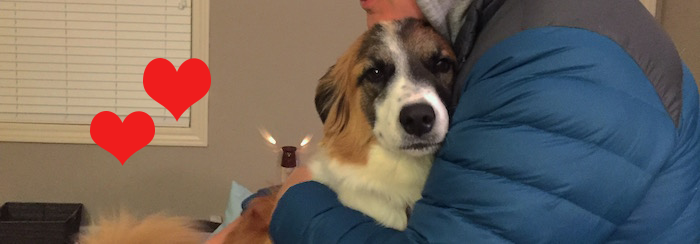Why I say “I love you” to my dogs
I talk to my dogs a lot. It’s my own language with them, full of english, some made-up words and weird phrasing. Let me give you some examples:
“Hi honey, are you being ‘a good’?” (Hello honey, have you been behaving?)
“Oh, Feen is bein’ a bean! He’s my Feen Bean!” (Finnegan is being a silly boy. He is like my “bean” and only he and I really know what that means.)
“Hee-yah!” (Here!)
“Criss criss criss!” (Let’s cross the street right here.)
Here’s a classic:
“Hey guys, no balls on the bed, no bones on the bed, no bites on the bed, no fights on the bed.”
That one actually translates exactly to English. Assume the “always be good” mantra, dogs!
They get me. I’m pretty sure of it*.
Now, there is one phrase that I make a habit of saying, and that’s “I love you.”
When you realize your dog understands a word or phrase that you say a lot, you get an amazing feeling. It’s a sense of accomplishment. Or, let’s be honest, it may be a made-up word in your english dictionary, but it’s a word you say when you mean that one thing that you (and just you) and your dog are on the same page about.
For those beginning years, it may be “sit” or “down.” And as your relationship progresses, more meaningful sentences will start to take root. But how exactly is your dog supposed to know that when you say, “I love you” that you really mean, “I love you”?
Consistency is key
A big part is the tone of voice you use when you say the word or sentence. I believe that it really doesn’t matter what you say to your dog. What matters is that you say the same thing in the same tone of voice every single time. Higher pitched tones are associated with more acceptance, while lower pitched tones are more threatening. You could praise your dog with, “Good boy!” in a high-pitched voice, or with, “Corn maze!” in an equally high-pitched voice. Being consistent is where he will learn what you like very quickly, and will make it his goal to hear the appropriate phrase after completing an action.
For something like, “I love you”, there is more meaning behind the words. What your voice does when you say “I love you” is special. Those three words aren’t meant for everyone to hear. If you mean what you say when you say it, your dog will soon find tranquility and pure bliss from your delivery. I usually follow it up with a great big kiss, too.
“I love you” is a very strong statement. Even if all the other glib glab I speak to my dog doesn’t really make any sense, and even if the words “I love you” don’t fully resonate with my dog, there is a sentiment behind the words that transcends. I say the three words because my dogs are my family. Quite simply, I do love them and I just don’t want to hold it back! And I also make it a point to say the words frequently so that it becomes common place. I know the feeling I’m trying to convey when I say the three words. My hope is that my dogs do as well.
*Who really knows. They’ve got hot, sometimes poopy, breath.
